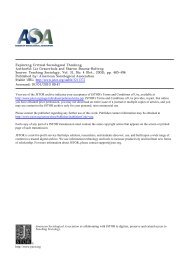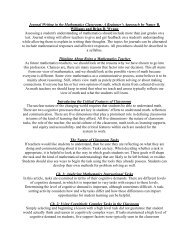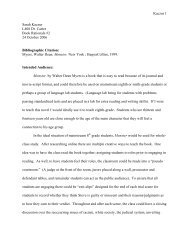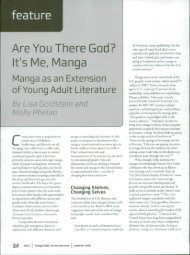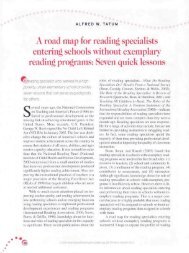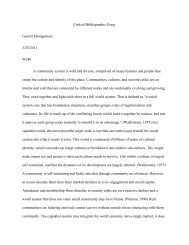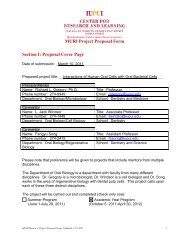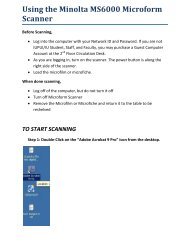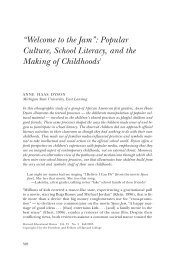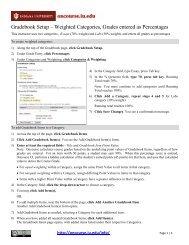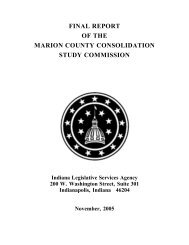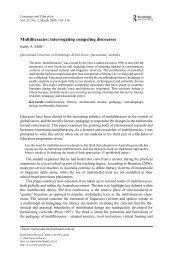Night. Night - Oncourse
Night. Night - Oncourse
Night. Night - Oncourse
Create successful ePaper yourself
Turn your PDF publications into a flip-book with our unique Google optimized e-Paper software.
Kaczur 12<br />
BODY:<br />
LEHI -- Kellie Richins saves letters from Elie Wiesel in the same box in which she keeps cards from<br />
her husband. The letters from the Nobel Peace Prize recipient and author, she says, are as precious to<br />
her as notes from her spouse.<br />
Last fall, after her junior-class students at Lehi High School finished Wiesel's book, "<strong>Night</strong>," the<br />
English teacher was inspired to learn more about the Holocaust and why 11 million people -- including<br />
Jews, mentally ill, physically handicapped, those considered gypsies, Jehovah's Witnesses and<br />
homosexuals -- were put to death.<br />
"I wanted more knowledge for myself," she said, "so I could share it with my students."<br />
Richins wrote a letter to Wiesel and invited students to do the same. He responded with two letters:<br />
one for the students, one for Richins. She now has both letters at home.<br />
The Alpine educator also applied -- and was accepted -- to the Holocaust Remembrance Project.<br />
Richins, who had to write an essay as part of her application, attended with six other teachers and a<br />
handful of students from across the United States.<br />
Richins was able to meet Wiesel during the July 16-22 project. She said she felt intimidated while<br />
penning her letter to him. After all, she said, his writing in "<strong>Night</strong>," which describes his experiences as<br />
a teen in the Auschwitz and Buchenwald concentration camps during World War II, was so strong and<br />
clear.<br />
"And then I promised him, I made a pledge for me personally, that I would never forget what the Jews<br />
had to suffer because of their religious convictions," she said. "I would do my part not to permit<br />
intolerance and not blame my problems on another race."<br />
Wiesel responded graciously. "Your students are privileged to learn from a person with such<br />
commitment to education and memory," he wrote. "I am honored to share the teaching profession<br />
with someone like yourself."<br />
Wiesel's letter to the six Lehi students contained comments for each of them.<br />
One student asked Wiesel how the experience changed his Jewish faith.<br />
"Even during those dark times, I never lost my faith in God," Wiesel wrote. "Rather, I protested<br />
against and questioned God's silence. I still believe in God but my faith is a wounded faith."<br />
Richins went to Washington, D.C., to tour the U.S. Holocaust Memorial Museum and visit with nine<br />
Holocaust survivors.<br />
"(The survivors) traveled with us everywhere we went," she said. "They ate every meal with us. They<br />
each shared their own story with us. They were a wealth of information. They were right there. We<br />
could ask them anything we wanted, any time of day."<br />
She returned to Utah with $1,500 in educational materials such as videos and books she believes will<br />
enhance teaching of Holocaust-era literature. Richins will donate some of the materials to the Alpine<br />
School District, she says, to assist other teachers.<br />
The value of teachers traveling to receive Holocaust education is that they will obtain correct materials<br />
to diffuse myths, said Pat Drussel, a teacher at Provo's Dixon Middle School who is working with the<br />
Utah State Office of Education on Holocaust education.<br />
They also learn about the importance of teaching tolerance, she said.



